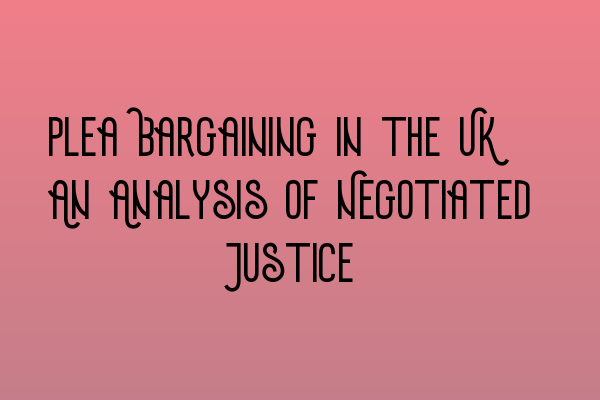Plea Bargaining in the UK: An Analysis of Negotiated Justice
Welcome to our blog post on plea bargaining in the UK. In this article, we will delve into the concept of negotiated justice, the benefits it offers, and its implications in the criminal law system. Whether you are a law student preparing for the SQE exams or a legal professional seeking a deeper understanding of plea bargaining, this article will provide you with valuable insights.
Understanding Plea Bargaining
Plea bargaining is a process where the defendant and the prosecution reach a mutually acceptable agreement in a criminal case. It involves the defendant pleading guilty to a lesser charge or receiving a reduced sentence in exchange for providing information, cooperating with the investigation, or other considerations.
In the UK, plea bargaining has gained significant attention due to its potential impact on trial outcomes, case loads, and sentencing. It is crucial to analyze the pros and cons of plea bargaining to appreciate its effects on the criminal justice system.
Benefits of Plea Bargaining
One of the key advantages of plea bargaining is its ability to expedite the resolution of cases. By avoiding lengthy trials, both the courts and defendants can save time, resources, and costs. Additionally, plea bargaining can help reduce the backlog of cases, ensuring a more efficient criminal justice system.
Plea bargaining also encourages cooperation between defendants and the prosecution. In exchange for their cooperation, defendants may receive reduced charges or sentences. This may incentivize individuals with knowledge of criminal activities to come forward and assist in the investigation, leading to a higher likelihood of successful prosecutions.
Furthermore, plea bargaining enables defendants to have more control over their destiny. By negotiating a plea agreement, defendants can potentially secure a more favorable outcome compared to the potential risks and uncertainties associated with a trial. This allows individuals to make informed decisions in their best interests.
Implications and Criticisms
Despite its benefits, plea bargaining has garnered criticism for potentially leading to injustices. Critics argue that innocent individuals may be pressured into accepting plea deals to avoid the risks and consequences of a trial, even if they maintain their innocence. This raises concerns about the fairness and integrity of the criminal justice system.
Moreover, some argue that plea bargaining might contribute to a culture of leniency, whereby offenders may receive lighter sentences than they deserve. This can undermine public confidence in the criminal justice system and lead to a perception of inequality.
Conclusion
In conclusion, plea bargaining is a complex and controversial topic in the realm of criminal law. It offers benefits such as faster case resolution, increased cooperation, and defendant control over outcomes. However, it also raises concerns about potential injustices and leniency.
As the SQE exams approach, understanding plea bargaining will be crucial for future criminal law practitioners. If you’re looking for comprehensive preparation materials, make sure to check out our related articles and courses:
- SQE 1 Practice Exam Questions
- SQE 1 Practice Mocks FLK1 FLK2
- SQE 2 Preparation Courses
- SQE 1 Preparation Courses
- SRA SQE Exam Dates
We hope this article has provided you with valuable insights into plea bargaining in the UK. Stay tuned for more informative content on criminal law and practice!
